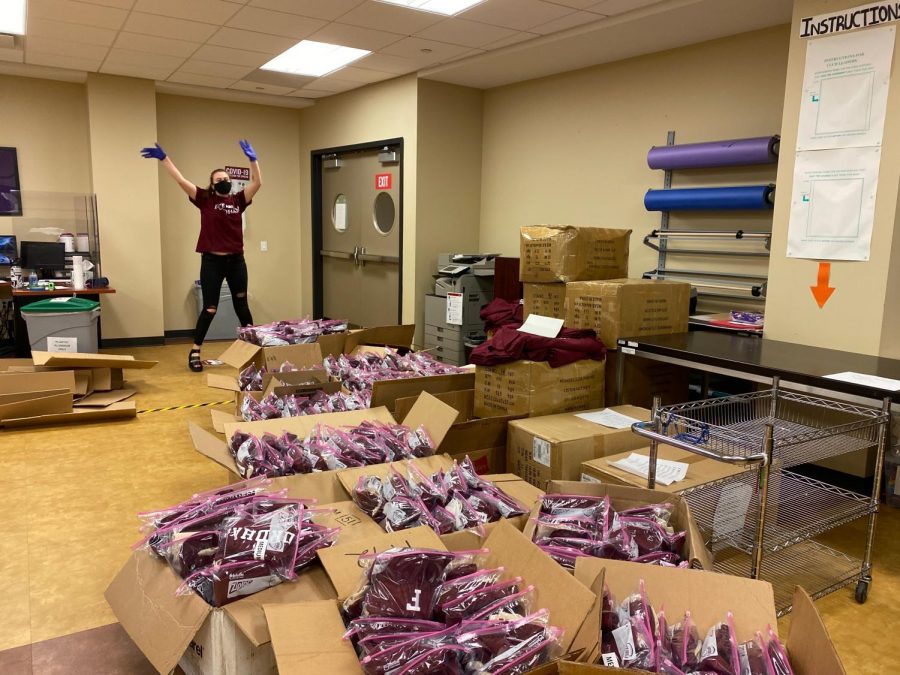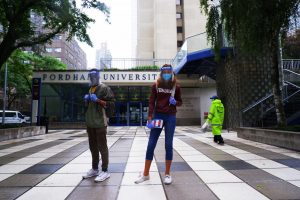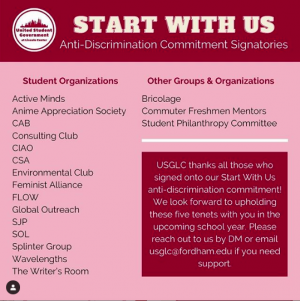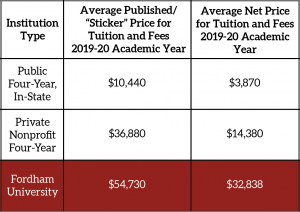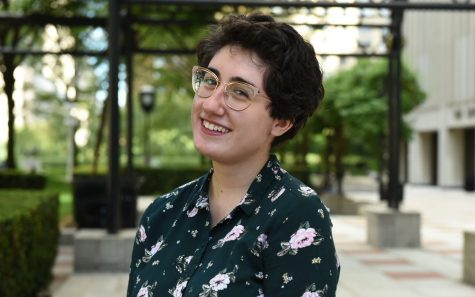Orientation Tests Fordham’s COVID-19 Safety Measures
COURTESY OF ZOE DEMACOPOULOS
Packaging first years’ Fordham gear in individual Ziploc bags was one of the precautions Lincoln Center OLs took to conduct orientation safely.
August 27, 2020
Orientation leader (OL) training this year served as a microcosm for the coming semester. All OLs had the option to participate in a hybrid format or fully online, and they and the Class of 2024 were offered the same choice for orientation. OLs who completed training in-person arrived the week of Aug. 16 and were some of the first to live under the COVID-19 preventative measures outlined in the Fordham Forward reopening plan.
“I think they’re doing as much as they can, in my opinion,” Lincoln Center OL Amber Ray, Fordham College at Lincoln Center (FCLC) ’21, said about the protocols that were put in place, such as mandatory mask-wearing, physical distancing and pre-packaging meals. These policies were also implemented at the Rose Hill campus.
The experience prompted a discussion on long-term student safety during the pandemic. Differing views emerged of the Lincoln Center campus and the Rose Hill campus with regards to orientation and how precautions are to be implemented at each, but OLs from both shared a common concern: whether administrators and students alike will do their part to maintain campus safety.
If those videos are coming from other Fordham students that are on campus saying, ‘Come on, guys, why are you doing this?’ That has to say something. Samantha Rizzo, FCLC ’22
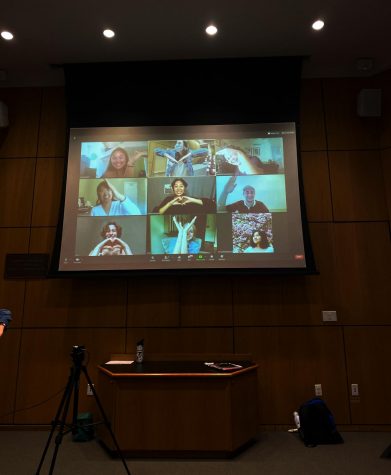
Most of the student body’s glimpse into OL training occurred on Aug. 20, when the Instagram account @lc_sinners posted a video of a large group of Rose Hill OLs dancing on the steps of Keating Hall. The caption read, “Orientation ‘LEADERS’ congregating with each-other in a 100+ person group (well above the 25 person limit). This is how the ‘leaders’ who are meant to control the viral spread on campus are conducting themselves. If they can’t follow the rules themselves, how can we expect them to enforce the rules?”
Keith Eldredge, assistant vice president and dean of students at Lincoln Center, confirmed the next day that the event was university-sponsored. “On Thursday night in front of Keating Hall, Student Involvement staff held one of a few carefully-managed socially-distanced events for a limited number of Orientation Leaders held in a large outdoor area. NYC and Fordham policy allow for gatherings following social distancing requirements and the wearing of face coverings.”
Public Safety Director John Carroll added that the event was staffed by the Rose Hill Office for Student Involvement, which oversees Orient RH, the orientation program at Rose Hill.
“Public Safety was not specifically assigned to the event; but, did respond there after being notified of a complaint. When the Public Safety Duty Supervisor responded, he reports that he did not observe any violations of law or of University guidelines,” Carroll said.
However, the event reportedly included more than 100 people, which contradicts the cap Fordham previously placed on event attendance: 50 people or 50% capacity of a venue, whichever is less. Earlier this month, students were also made to sign the Ram Pledge, an agreement to follow this and other COVID-19 safety guidelines or else face disciplinary action.
Juliana Burke, Fordham College at Rose Hill ’22 and a Rose Hill OL, attended the event. She said it was mandatory for all in-person Rose Hill OLs. There were about 235 total OLs at Rose Hill this year, approximately 200 of whom participated in person.
“At the time, nobody saw a problem with the event because they were just trying to be kind to us or whatever, put on something nice for us,” she said.
“You could take a picture, but you had to be six feet apart … We could stand at the tables and eat, but it had to be a two-person table, and everything was socially distanced. In the video, it looked like everybody was touching and no masks, but everybody was wearing a mask as far as I saw. Maybe I didn’t see it, but all the coordinators were standing there enforcing everything so strictly.”
Samantha Rizzo, FCLC ’22 and a virtual Lincoln Center OL, said she heard a similar account of the event the next day: “They were spread out, they were socially distanced. The way the video was made made it look suspicious, but it wasn’t as bad.”
However, she said she was still unsure what regulations were put in place. Most of the concerns she heard among OLs centered around whether students would keep each other accountable for upholding safety measures, especially in the long-term.
“If those videos are coming from other Fordham students that are on campus saying, ‘Come on, guys, why are you doing this?’ That has to say something.”
Students did voice their disapproval when the video first surfaced. @lc_sinners asked its followers for feedback on the video and received dozens of responses, which were then posted anonymously on the account’s story. Multiple respondents worried that events like it could lead to an early closing of Fordham’s campuses, should an outbreak subsequently occur.
“if i get sent home bc some orientation leaders had to do the cupid shuffle…..” one respondent wrote.
“If that’s how OLs are acting, how are freshmen going to act?” asked another.
Burke disagreed with those who said that the OLs in attendance would “be the reason why Fordham shuts down” and were to blame. She, along with some respondents to @lc_sinners’ story, said the administration was at fault for allowing the gathering to occur.
“It’s not our fault that we were forced to go to the event,” Burke said. “In my opinion, should it have happened? No. I don’t think the event should have happened, and I’m not making excuses or whatever. But at the same time, you can’t expect students to not mingle with one another, and that’s literally all that we were doing.”
Rizzo was disappointed when she learned that the university had approved the event, especially since Lincoln Center training eliminated its in-person “fun” programming due to space constraints.
“I understand they do have more space to be more spread out, so again, the two campuses are very different,” Rizzo said. “I don’t know, because it looked bad, so knowing that the university said that was okay kind of makes me upset.”
We advocated for ourselves because we were essentially at the front line of danger. Juliana Burke, FCRH ’22
Discontent continued to spread that weekend when students found out the annual candle-lighting ceremony on Edward’s Parade, rumored to include more than 1,000 attendees, would still take place in-person.
After receiving pressure from OLs, the administration moved the event online.
“It’s great that we will have some things in person, but that’s not necessary to have a bunch of people on Eddie’s holding a candle for five minutes,” Burke said. “So many orientation leaders emailed the deans and literally everyone possible, and it ended up being virtual. We advocated for ourselves because we were essentially at the front line of danger.”
Some OLs also reached out to the Instagram account @FordhamSimplified to anonymously share their concerns. The account’s administrators said 14 OLs, almost entirely from Rose Hill, reached out, and quotes attributed to OLs were included anonymously in an Aug. 23 Instagram post.
The post was also prompted by “other responses from students who had witnessed questionable OL behavior and wanted to report it,” including alleged off-campus partying.
“The concerned responses definitely comprised the majority—OLs generally had a consistent theme of ‘we are genuinely worried because we’re uncomfortable with the actions administration is taking,’” the account administrators wrote to The Observer.
“We did receive a couple responses that denied certain points, like OLs partying, but we had enough evidence to the contrary (including videos sent to us) that we felt comfortable treating that information as fact.”
Burke said there were similar sentiments among the Rose Hill OLs. “I’ve heard things from (people who are) extremely nervous for their safety, to not caring in any capacity,” she said. “So it really is on a spectrum; however, I would say that the majority of people are definitely concerned — not fearful where they’re like, ‘I’m packing up my stuff and leaving,’ but more so like, ‘Fordham needs to get it together a little bit, answer our questions and do better.’”
According to Lincoln Center OLs, their training proved different; that is, less populated. Ray said approximately 25 OLs, including herself, completed training on campus, and more arrived afterwards to participate in the orientation program in person. Lincoln Center had a total of 98 OLs, including captains.
In order to be most accessible to all OLs and accommodate safety guidelines, the Lincoln Center OL training consisted of “almost exclusively presentations,” Ray said, by guest speakers in person and on Zoom.
Guest-speaker presentations at Lincoln Center’s orientation occurred in rotations of five groups instead of two, and venues were deep cleaned in between.
At Rose Hill, in contrast, all guest speakers delivered their presentations via Zoom for both training and orientation. Small group meetings were conducted entirely on Zoom at Lincoln Center, but in person and outdoors at Rose Hill.
Both campuses’ orientations also had a wristband program in place to signify students’ health. At Lincoln Center, student staff and first years received a yellow band if they have been tested by University Health Services. At Rose Hill, they received an orange band if they have a confirmed negative result and a yellow band to signify that they are waiting on their results from Fordham.
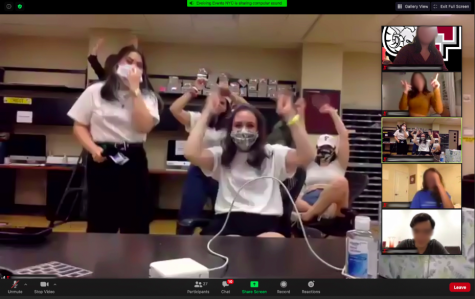
Burke expressed concern about allowing students on campus without a confirmed result, saying it potentially puts others at risk.
To minimize risk on the small campus, most social events and bonding activities for Lincoln Center orientation were modified or scrapped, Ray and Rizzo said. These included Night of Welcome and excursions throughout the city.
On Aug. 22, the Student Involvement Instagram page @ramsinvolvedlc announced an Open Mic Night and a “Social Dis-dancing Party” in their place, both of which occurred via Zoom.
Whereas social events at past orientations were meant to provide an alternative to going out to parties or bars at night, this year’s programming had the added incentive of keeping students on campus to remain under Fordham’s COVID-19 safety protocols.
They weren’t listening to our concerns. We’re already volunteers; this is our philanthropy to the community, that we can give our time and we don’t get paid … We’re doing this because we love Fordham. Anonymous Lincoln Center orientation captain
Some OLs voiced concerns during the Lincoln Center training and anticipated threats to student safety. It was originally planned that first years would have 90 minutes to eat lunch and move to their academic advising room on the second day of orientation. OLs worried that, with elevator capacity now capped at four in the residence halls, many students would either be late or forced to break distancing guidelines while on or waiting for the elevators.
In addition, “There was going to be an option for some students to watch these virtual presentations together in classrooms … and they were asking us to help with that,” Ray said.
One Lincoln Center orientation captain (OC), who requested anonymity, said, “It was frustrating all around that the dean’s office wanted us to be the ones out there herding the students and directing them and making sure they were practicing social distancing, but wouldn’t even show their face at the orientation program originally. But they did eventually; that’s what they budged on.”
When OLs brought up these points during a presentation by FCLC Dean Laura Auricchio, Ray said the OLs were dissatisfied with her initial response. Ray described Auricchio as “defensive” and that “she didn’t really know what to say” to the OLs’ questions; the OC said they felt “disrespected” and “dismissed” by the dean’s response. According to Ray, Auricchio was ultimately “very understanding” after further discussion. She extended the break period and agreed to have staff from the dean’s office monitor the rooms, and OLs were still allowed to help but were not expected to do so.
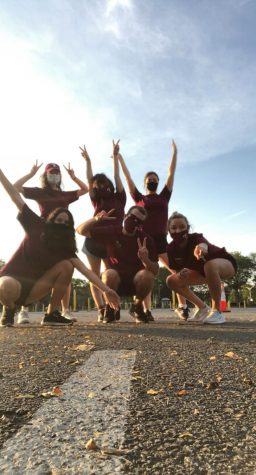
Nonetheless, “I really hope we get an apology,” the OC said. “They weren’t listening to our concerns. We’re already volunteers; this is our philanthropy to the community, that we can give our time and we don’t get paid … We’re doing this because we love Fordham.”
Ray and Burke both said they were, however, satisfied with how students upheld safety measures at their respective campuses. Burke said Rose Hill’s orientation coordinators, also students, consistently and respectfully reminded the OLs of the protocols to follow during their training, and Ray said of Lincoln Center, “Everyone that I’ve observed at our in-person training has been really good about following all the rules.”
Optimizing safety wasn’t a simple process; the Lincoln Center OC said it took a couple days to figure out, for example, how to best distribute the first years’ “swag bags” of Fordham gear; they ended up packing each student’s gear in a Ziploc bag, fully outfitted with gloves to eliminate direct contact, which took four hours.
But to that OC, it was worth it. As far as they witnessed, staying safe was worth it to the first years, too.
“They’re just smart. I think they just know that they’re supposed to be following the guidelines,” the OC said. “They were seniors who got prom and graduation taken away from them because of the virus, and I think they don’t want to miss out on anything else.”
In light of the Aug. 20 event and others, Burke acknowledged that precautionary guidelines can only go so far as the academic year begins. She believes it will be “impossible” to always maintain a six-foot distance from others and keep a mask on “24/7.” She added, “Standing and gathering, speaking to people, is going to happen on campus no matter what.”
“I don’t know how enforcement is going to work, necessarily,” Ray said of the rest of the year. Public Safety is supposed to enforce mask-wearing around the campuses, and like Rizzo, she mentioned the expectation that students hold each other accountable for complying with regulations.
“I think that’ll be something that will have to be seen.”

